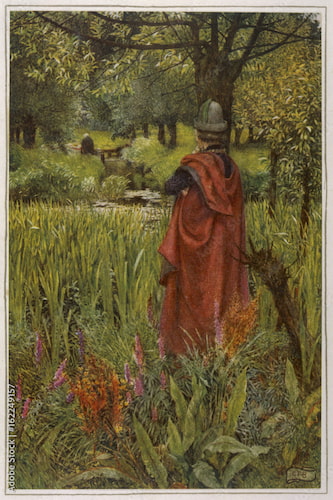Honest and Courtly Love in “Lancelot and Elaine”
by Maggie Martone.
Throughout the many works of Victorian Medievalism literature I have encountered this semester, I have concluded that I will never get used to the smack to the face that I receive with every odd implication of courtly romance of the Middle Ages, especially those which involve the knight Lancelot and Queen Guinevere. In contrast to their love, within the story of “Lancelot and Elaine” of Idylls of the King by Alfred Tennyson, we see the steadfast honest love of Elaine that she feels for Lancelot. Yet despite her true devotion and care for him, Lancelot completely rejects her to maintain his relationship with Guinevere, the wife of his bestie King Arthur! The events of this narrative seem unnecessarily dramatic from a present-day perspective, yet the conflict demonstrates the values of the differing types of romance for the period with the clash of honest and courtly love.
The love of Lancelot and Guinevere continues to prove itself to be the ideal of courtly love as one of the aspects of this love is, oddly enough, the adultery that is associated with it. This exemplifies a lover’s willingness to defy odds and do whatever it takes to prove one’s love and loyalty for the other. The intensity of this aspect is demonstrated through Lancelot’s choice to remain with Guinevere. Despite Lancelot seemingly not realizing that Elaine would eventually die of lovesickness, the impact of his decision shows the sacrifices that are made to maintain the sort of “code” of courtly love. It is also important to realize that Lancelot is not TRYING to do this, we are supposed to determine that the relationship is natural and destined to be. This connects to the idea of the religion of love where these feelings are treated as something divine and deserving of intense devotion, emphasizing once again the intense loyalty that is expected in this kind of romance. Yet Lancelot seems to regret and question his feelings for Guinevere when he sees Elaine dead, realizing that she had loved him more truly than Guinevere (GASP!). When looking through a purely Medieval lens, this revelation seems to emphasize even more that Lancelot is meant to be with Guinevere as he could’ve had this absolute catch, but she’s gone now so I guess destiny determined they weren’t meant to be?
Well Lancelot and Guinevere had been going through a rough patch due to Guinevere’s jealousy at the time so that may have been the reason for this mindset. Either way, the two adulterers eventually go back to being as lovey-dovey as they were before, so… all’s well that ends well? Well, the damage that is done when talking in terms of certain characters’ reputations and courtly love’s overall harm to others allows for the honest love of Elaine to shine in this narrative. Her feelings for Lancelot is the ideal for this kind of love. For Tennyson to depict this love to be a worthy contender against the most famous and admired of all courtly romances is a pretty big deal. Elaine heals Lancelot and even asks him to at least remain in her life as a friend even after she is rejected, thus demonstrating the lengths in which she goes for him and her reputation as a “worthy maiden”. She even falls in love with Lancelot before she knows who he is! This demonstrates the admirability of love at first sight as it is pure and not thought of to be sexually driven like some may argue it is in the modern day. This love at first sight plus Guinevere’s jealousy is likely why Lancelot became wary of Guinevere’s feelings as he hints that maybe she cares more about her pride than her love for him unlike Elaine who openly shows her sorrow in death as her body floats in a boat for all of Camelot to see.
Overall, the narrative emphasizes that despite honest love being capable of tipping the crown of the noblest of courtly loves, the seemingly ideal love of Guinevere and Lancelot reigns supreme. I believe the honest love of Elaine was Tennyson sneaking in a reference to the more modern idea of romance that was developing into the Victorian era and that eventually became what many consider to be the ideal today, giving us a little hint of the “present” to keep us captivated in the future.
https://stock.adobe.com/images/lancelot-musing-on-elaine-s-death/162249157?prev_url=detail






